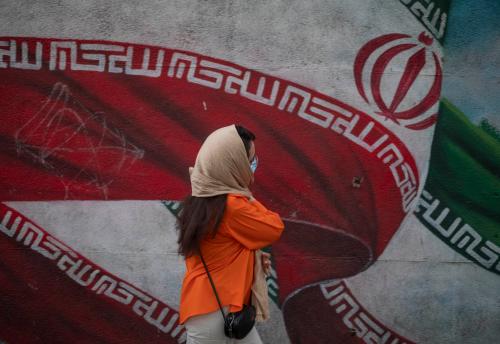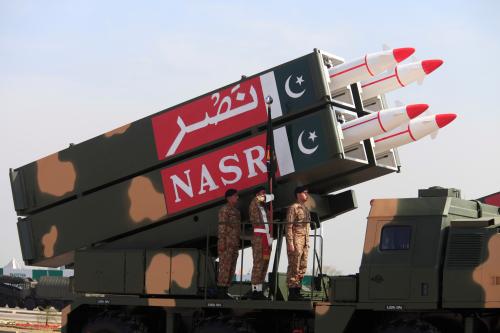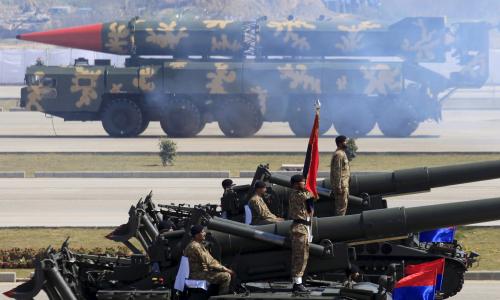So which is it? Is Pakistan just the latest crisis, the newest international hotspot to give newspapers fresh material when readers tire of the financial meltdown and the two wars our own troops are fighting? Or is it, as Secretary of State Hillary Clinton has argued, on the verge of posing a mortal threat to the entire world?
Surely a country with 100 nuclear weapons, numerous extremist groups linked to al Qaeda and, in all likelihood, Osama bin Laden and Ayman Al- Zawahiri themselves holed up somewhere in its remote regions should put the fear of God into all of us. But there may be a case for somewhat more optimism than is currently prevalent in Washington.
My estimable Brookings Institution colleague Bruce Riedel, who ran the Obama administration’s review of Afghanistan and Pakistan earlier this year, has been calling Pakistan the most dangerous country on Earth for a decade and it is hard to disagree. Indeed, Riedel worries about not just a collapsing Pakistan, but also a fundamentalist Pakistan friendly to al Qaeda that gains control of the country and its nukes. The worry here is not just the Taliban, based as they are in the country’s remote western regions and dominated by Pashtuns (who are often viewed as second-class citizens by other Pakistanis), but also groups with Punjabi representation and heavy presence in the major cities, like Lashkar-e-Taiba and its offshoots.
Of course, waiting until Pakistan goes under and then taking drastic measures is a bad strategy. Unless we got very lucky, or unless the Pakistanis asked us to help soon enough, it probably wouldn’t work. We would not want to bomb nuclear sites that remained in government hands, even if Pakistani forces seemed to be gradually losing control of the situation. However, if we waited even an hour or two after the sites were seized, the weapons could already have been removed illicitly (and it would take bombers or cruise missiles that long to fly to targets even if they had been prestationed).
Also, our weapons might not penetrate Pakistan’s hardened facilities. Pakistan, after all, has long feared a pre-emptive strike against its nukes by India, so it has probably put its weapons deep underground and surrounded them with lots of concrete. U.S. special forces might be able to penetrate such sites. But they probably wouldn’t be deployable fast enough in sufficient numbers. There could also be some Pakistani weapons in transit, or in secret sites (so as to complicate any Indian first-strike option). The United States could probably only help meaningfully if Pakistan disintegrated gradually, with its leaders recognizing what was happening and then asking for help to create secure perimeters around nuclear facilities.
But there are several reasons why I am not fatalistic about the situation today in Pakistan, and why I don’t think disintegration is likely:
- The country is now going after extremists on its own territory with far more conviction than in the past. While it may not yet reach the level of the Sunni Awakening in Iraq, there has been a shift among the ruling elite as it sees extremists try to undermine the very essence of Pakistan — a state governed by civilians under a constitution — in part by assassinating some of its leaders (notably Benazir Bhutto). Last week’s strengthened offensives in Buner and the Swat Valley may portend a new trend.
- Pakistan is very poor, but it is not a failed state, and its economy actually grew respectably during much of this decade. It can resume that track as the global economy starts to recover. That said, we need the additional aid promised in the Kerry-Lugar bill, as well as commensurate help from other donors. Even more, we need to push for two more elements of a viable economic plan: A free-trade accord with Pakistan, as well as incentives to help Islamabad direct more incoming aid money to Pakistan’s most pressing needs, notably stabilizing the country’s northwest. Aid conditionality that rewards good policy with more money (rather than threatening to cut aid for poor policy — the nuance is important here) is a good way to pursue this.
- Pakistani leaders like Chief of Staff Gen. Ashfaq Kayani are now getting serious about counterinsurgency — insisting, for example, that officers wishing promotion do a tour in the country’s troubled northwest. American aid is crucial and will help in this regard, if approved by Congress. Kayani also needs to do more to push sympathizers of extremist groups out of the military and intelligence services, however.
Finally, Barack Obama has directed the nation’s best foreign-policy analysts and military leaders to focus on Pakistan. Yes, the United States could fail — but the odds of success, or at least avoiding disaster, counsel against despair and defeatism.



Commentary
Op-edRays of Hope in Pakistan, the World’s Powder Keg
May 12, 2009